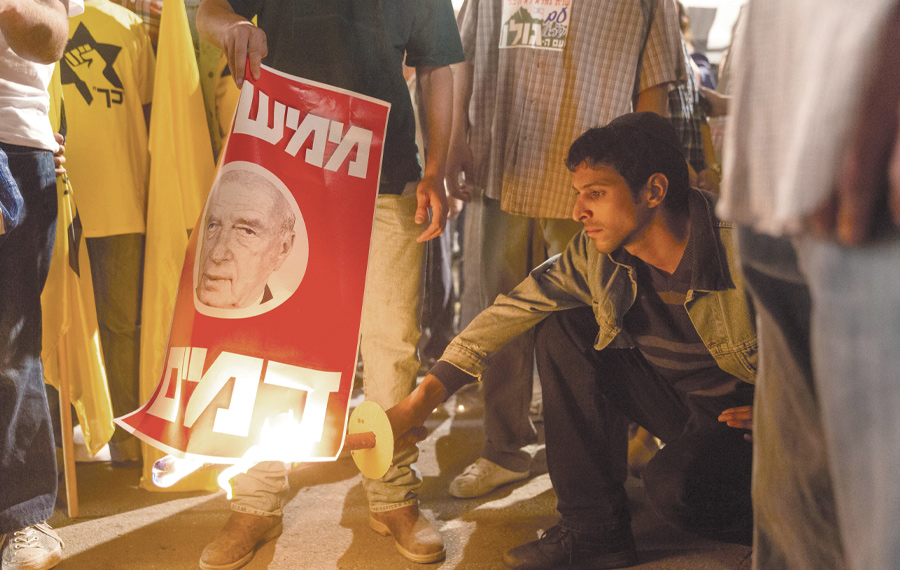 Yehuda Nahari Halevi
in “Infatuation”; Photo by Yael Ilan/Rabin Project LLP
Yehuda Nahari Halevi
in “Infatuation”; Photo by Yael Ilan/Rabin Project LLP When Israeli Prime Minister Yitzhak Rabin was assassinated in November 1995, his hope of a lasting peace between the Jewish state and the Palestinians died with him. The events leading up to his murder unfold in “Incitement,” told from the point of view of assassin Yigal Amir, an Orthodox Jewish law student who believed in a nationalist divine right.
The winner of the Ophir Award for Israel’s best feature film of 2019 and Israel’s entry for the 92nd Academy Awards next February for best international feature film, “Incitement” will have its U.S. premiere on the opening night of the 33rd Israel Film Festival on Nov. 12.
“I wanted to make the film because it’s a very important topic in Israeli history and because of the trauma that’s involved, both on a national level and a personal level,” filmmaker Yaron Zilberman (“A Late Quartet”) told the Journal. “Experiencing this assassination was shocking because it was the prime minister and also because the assassin was an Orthodox Jew. I wanted to understand in a more profound way why it happened and what we can learn from it. It’s relevant more than ever today because incitement is ongoing and violence and the potential for violence to erupt because of irresponsible statements by leaders.”
Zilberman chose to tell the story from Amir’s point of view to explore the factors that drove him to kill and give it a fresh perspective. “When you tell a story from an angle that has not been told before, it’s unexpected and you have new insights, and it makes it a story that people want to watch,” he said. “There is the danger of somebody watching it and feeling empathy for the murderer but we decided that the big picture was more important: to tell society the inner workings of incitement, how a relatively moderate activist turns into an assassin using religious and political justification.”
To achieve tonal balance and ensure accuracy, Zilberman and co-writer Ron Leshem spent six years working on the film, interviewing interrogators, lawyers, judges, journalists, Amir’s family and friends and the killer himself. Two researchers from the Orthodox community also provided valuable insights.
Zilberman said he expected divided reaction in Israel, but was thrilled when a leading right-wing journalist tweeted that “Incitement” was a must-see movie. He’s also encouraged that young Israelis have been buying tickets, and is looking forward to coming to Los Angeles for the premiere. “It’s an honor for us to be the opening movie at the Israel Film Festival and get an opportunity to have a conversation with the community in L.A.,” he said.
“If [Yitzhak] Rabin had been alive, in my opinion there would be a better relationship with the Palestinians, perhaps even an everlasting peace. I cannot prove that but that’s what I believe.”
— Yaron Zilberman
Born in Haifa, Zilberman is the son of Israeli parents of Polish heritage, with a rabbi great-grandfather and roots in Jerusalem dating back to the Ottoman era on his mother’s side. “I was raised completely secular,” he said, “but I’m proud to be an Israeli and I’m proud of my Jewish heritage.”
He studied physics at MIT and crunched numbers on Wall Street. “But art was what I always loved most growing up, from painting to music to poetry,” Zilberman said. When a friend asked him to help out on his movie, he learned the ropes and changed course. “I made my first movie, ‘Watermarks,’ a documentary about female swimmers in the 1930s who escaped from Vienna. From the first interview, I knew that it was what I wanted to do for the rest of my life.”
While gearing up for the theatrical release of “Incitement” on Jan. 24, Zilberman, who is currently based in New York City, is working on the TV miniseries “Valley of Tears,” about the Yom Kippur War, and has several projects in the pipeline. One is a World War II-set story about a young Jewish girl and her mother’s escape to the Carpathian Mountains. The other is about public relations pioneer Edward Bernays, whose “wild and crazy campaigns shaped America,” Zilberman said.
In a hypothetical Israel in which Rabin had lived, Zilberman imagines that “things would be radically different. Some say peace would not have been achieved no matter what. For me that’s the wrong conclusion,” he said. “If Rabin had been alive, in my opinion there would be a better relationship with the Palestinians, perhaps even an everlasting peace. I cannot prove that but that’s what I believe.”
He also believes there’s takeaway value from the tragedy. “It’s a great story of how someone goes from being a relatively moderate political activist to becoming an assassin in a year and a half,” Zilberman said. “For me, the most important lesson is understanding that incitement, the use of inflammatory words by the gatekeepers of society — religious leaders, politicians, university professors — eventually causes violence to show its face, and it can lead to chaos and a danger to democracy. I want people to see the inner workings of this process, and by connecting the dots, not to allow it to happen again.”
“Incitement” premieres at the IFF Nov. 12 at the Saban Theatre (opening night gala), with additional screenings at Laemmle’s Ahrya Fine Arts on Nov. 16 and at Laemmle’s Town Center 5 on Nov. 20. For more information, visit the website.






















 More news and opinions than at a Shabbat dinner, right in your inbox.
More news and opinions than at a Shabbat dinner, right in your inbox.